

The World of Dante. Dubliners. Heroes. Frankenstein: 10 possible meanings. 14 March 2011Last updated at 07:25 ET By Tom Geoghegan BBC News Magazine A global cinema audience will this week watch Danny Boyle's stage production of Frankenstein.
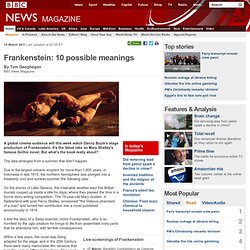
It's the latest take on Mary Shelley's famous Gothic novel. But what's the book really about? The idea emerged from a summer that didn't happen. Frankenstein's monster: Why gothic is more popular than ever - Features - TV & Radio. But it also reflects deeper contemporary fears of the apocalyptic and the macabre: of bad science and corrupt power.
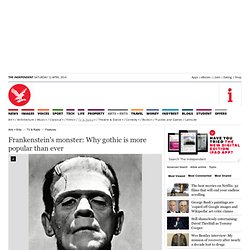
It reflects dark times, too, and offers escapism from austerity or insecurity – a safe, containable way to be scared. Most of all, perhaps, it addresses dark themes of psychosexuality. This autumn the gothic is everywhere: from Radio 4's Gothic Imagination to Tim Burton's Frankenweenie, and, tomorrow night, a new Channel 4 documentary examining the Frankenstein myth screened, fittingly, on Halloween. The Rime of the Ancient Mariner (text of 1834) by Samuel Taylor Coleridge. Rime of the Ancient Mariner - Orson Welles, Larry Jordan Part 1. Rime of the Ancient Mariner - Orson Welles, Larry Jordan Part 2.
Rime of the Ancient Mariner - Orson Welles, Larry Jordan Part 3. The Rime of the Ancient Mariner. Even though Samuel Taylor Coleridge 's Rime of the Ancient Mariner is one of the most influential poems in the English language, it's still a doozy of a confusing read.
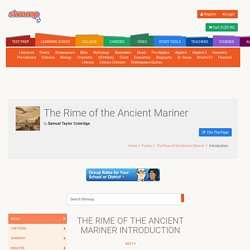
It's about an old sailor who stops a wedding guest from entering a wedding celebration, and says, essentially, "I know you want to get your drink and your dance on, but now I'm going to tell you a really long story about how I got my entire crew killed and almost died myself because I acted like a jerk while sailing the far reaches of the globe. " Chances are that this poem is unlike anything you've read before. It will probably leave you with a bunch of questions: Why does Coleridge speak in such an old-fashioned voice? Why does the poem sound so corny? Did Coleridge think this poem was a big joke? Dubliners. Dubliners Literature Guide. By James Joyce Page 1 of 4 Dubliners, by James Joyce, is a good reading choice for advanced level 12th-grade students.
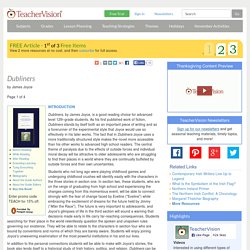
As his first published work of fiction, Dubliners stands by itself both as an important piece of writing and as a forerunner of the experimental style that Joyce would use so effectively in his later works. The fact that in Dubliners Joyce uses a more traditionally structured style makes the novel more accessible than his other works to advanced high school readers. The central theme of paralysis due to the effects of outside forces and individual moral decay will be attractive to older adolescents who are struggling to find their places in a world where they are continually buffeted by outside forces and their own uncertainties. Students who not long ago were playing childhood games and undergoing childhood crushes will identify easily with the characters in the three stories in section one. Dubliners. Jonathan Swift - A Modest Proposal. It is a melancholy object to those who walk through this great town or travel in the country, when they see the streets, the roads, and cabin doors, crowded with beggars of the female sex, followed by three, four, or six children, all in rags and importuning every passenger for an alms.
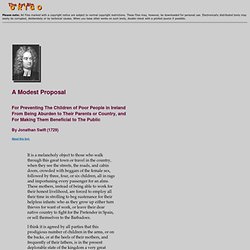
These mothers, instead of being able to work for their honest livelihood, are forced to employ all their time in strolling to beg sustenance for their helpless infants: who as they grow up either turn thieves for want of work, or leave their dear native country to fight for the Pretender in Spain, or sell themselves to the Barbadoes. But my intention is very far from being confined to provide only for the children of professed beggars; it is of a much greater extent, and shall take in the whole number of infants at a certain age who are born of parents in effect as little able to support them as those who demand our charity in the streets. Many other advantages might be enumerated. The Picture of Dorian Gray by Oscar Wilde. Search eText, Read Online, Study, Discuss.
Oscar, Oscar, Oscar, Forever is a long time...
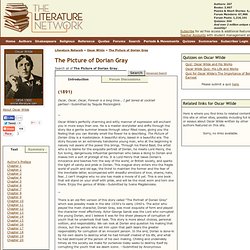
I get bored at cocktail parties! --Submitted by Tequila Mockingbird. Oscar Wilde's perfectly charming and witty manner of expression will enchant you in more ways than one. He is a master storyteller and drifts through the story like a gentle summer breeze through odour filled roses, giving you the feeling that you can literally smell the flower he is describing. Paradise Lost: The Poem. Darkness Visible Homepage - A resource for studying Milton's Paradise Lost. Danteworlds. Multimedia journey through Inferno. Lord of the Flies: Themes, Motifs & Symbols. Themes Themes are the fundamental and often universal ideas explored in a literary work.
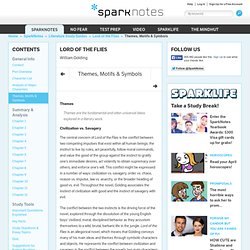
Civilization vs. Savagery. Alice’s Adventures in Wonderland. Through the Looking-Glass. And Then There Were None. And Then There Were None. The Iliad. Iliad. The Iliad (sometimes referred to as the Song of Ilion or Song of Ilium) is an ancient Greek epic poem in dactylic hexameter, traditionally attributed to Homer.
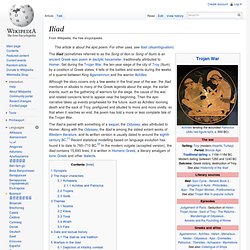
Beowulf - "Opening Lines" Resources for the Study of Beowulf. Resources for the Study of Beowulf. Frankenstein. Frankenstein : Mary W. Shelley. <div style="padding:5px; font-size:80%; width:300px; background-color:white; margin-left:auto; margin-right:auto; border:1px dashed gray;"> Internet Archive's<!
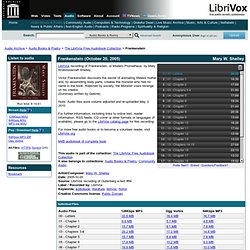
--'--> in-browser audio player requires JavaScript to be enabled. It appears your browser does not have it turned on. Please see your browser settings for this feature. </div> LibriVox recording of Frankenstein, or Modern Prometheus, by Mary Wollstonecraft Shelley. Victor Frankenstein discovers the secret of animating lifeless matter and, by assembling body parts, creates the monster who has no name in the book.
Note: Audio files were volume adjusted and re-uploaded May 3, 2010. For further information, including links to online text, reader information, RSS feeds, CD cover or other formats or languages (if available), please go to the LibriVox catalog page for this recording. Frankenstein; or, The Modern Prometheus (1818) by Mary Wollstonecraft Shelley. The Online Literature Library. Frankenstein (1931) Frankenstein Video SparkNote. A Cultural History of Mary Shelley's Frankenstein.